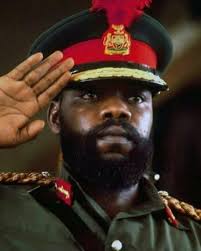
By Kalu Okoronkwo
There is nothing as frustrating as someone looking for something he doesn’t know, though he might even find it, but will not recognize it, because while the chase continues, the pearl could be in perpetual flight.
There seems to be a storm in the renewed cry for Biafra, a demand that, though draped in the language of freedom, has plunged the South East region not into liberation, but into chaos.
The South East is home to the Igbo people, a region with a proud history. It is the land of merchants and scholars, of craftsmen and innovators. Her sons and daughters have risen from the ashes of civil war to become global entrepreneurs, artists, and intellectuals.
From the humming markets of Onitsha, the industrious streets of Aba, and the tech-driven ambitions of Enugu, the South East of Nigeria pulses with life and potential. However, behind the vibrant scenario lies a growing storm, one powered not by vision but by disillusionment, anger, and a dangerous nostalgia.

The South East is no stranger to pain. Hurt by the brutal Biafran War of 1967–1970, a conflict that claimed over a million lives, the memory of suffering runs deep in the Igbo consciousness. It is no surprise, then, that the word “Biafra” still carries powerful emotional weight, evoking visions of dignity, lost glory, and the yearning for self-determination. But memory, if not handled with wisdom, can become a trap. And today, the call for Biafra has become less a strategic vision and more an emotional crusade, blind to the devastating consequences it courts.
The concept of Biafra should remain a powerful idea that fuels identity, excellence, and self-respect and not a physical struggle for a breakaway nation.
Opinions are rife from those who should know that even Chief Odimegwu Ojukwu, before he died, warned Igbos never to go that route again but should devote efforts to building Igboland.
All Igbos should be made to understand that the war that birthed Biafra in 1967 was not borne out of recklessness. It was borne out of pain, of massacres, injustice, and a desperate bid for dignity. But the cost was colossal: millions of lives lost, families torn apart, and a region left in ashes. From those ashes, the Igbo people rose again, not by guns or borders, but by grit, by intellect, by an unrelenting will to thrive in the very country they once tried to leave.
So what then is Biafra today, if not a state? It is an idea and it should remain so. A spiritual compass. A rallying cry for excellence. A symbol of self-sufficiency, unity, and cultural pride. To fight again for a physical country is to risk not just another war, but the erosion of the very values Biafra was meant to protect.
Nigeria is far from perfect. The Igbo have long felt marginalized, politically isolated, and economically shortchanged. But the answer is not retreat, it is reinvention. The most powerful nations on earth were not forged by fragmentation but by internal transformation. The South East should not be seeking to redraw borders, but to redraw minds.
Imagine a Biafra of the mind, where every Igbo person walks with dignity, not because they live in a separate country, but because they carry Biafra within. Where Biafra is expressed in the quality of their education, the sharpness of their enterprise, the depth of their culture, and the integrity of their leadership. That is a revolution more lasting than flags or slogans.
All Igbos should be made to accept the new concept to burn energy only required for the economic development of Igboland and not another request for Biafra, which was a mistake that started in 1967 that made Igbos politically and economically relegated in Nigeria of today. Igbos fought a civil war and lost because circumstances of that time pushed the Igbos to demand Biafra.
It is also on record that Ojukwu’s biological father foretold his son of the implications of his cessation agenda rather wanted him to buy time for wounds created on 15 January 1966 and 29 July 1966 to heal. But young Ojukwu, who wanted to rule a new nation, did not listen to his father and rushed to announce Biafra without adequate preparations.
The circumstances that led to the death of Ojukwu’s father in 1967, after the news broke over the radio that his son had declared Republic of Biafra, were mainly because of his son’s refusal to heed his advice, because Senior Ojukwu knew that Igbos before that 1966 incident were practically the real Nigerians that were committed to the cause of the Nigerian state.
The reality is that the Igbos had lot of things at stake outside Igboland and stood to lose all they laboured for if they abandoned Nigeria, a position also canvassed by Ojukwu’s senior who knew that since Igbos at that time controlled commerce in Nigeria, they needed a bigger country and market for their goods and services. Most of the resources that individual Igbos were using to develop Igboland came from regions outside Igboland.
The Biafra agitation is not just in its historical amnesia, but in its profound misunderstanding of today’s realities. Nigeria, for all its faults, is a vast and interconnected nation. The Igbo have spread across every corner, building businesses in Lagos, Abuja, Kano, and beyond. They are a national, even global force, shaping industries, culture, and commerce far beyond the perimeter of the South East.
To tear away now, to retreat into a new, untested nation carved out of emotion, is to gamble with the gains of decades of hard work. But the consequences of this gamble are far worse than just economic losses. A Biafra declaration today would invite political instability, military confrontation, diplomatic isolation, and internal division.
The South East, far from becoming a prosperous nation overnight, would face sanctions, supply chain disruptions, capital flight, and most dangerously, infighting among its own leaders. Who leads Biafra? Who speaks for it? Is it the activists in the streets, the politicians in exile, or the warlords waiting in the shadows? These questions have no clear answers and that uncertainty is a breeding ground for chaos.
Even more, the push for Biafra ignores the hard-earned lessons of modern nation-building. Secession is not a magic wand; it is a grueling, often bloody process that demands not just passion but deep, strategic planning, robust institutions, and a unifying national vision. None of these currently exists in the Biafra agitation.
Instead, what we see is a fragmented movement, torn between idealists, opportunists, and provocateurs, each more interested in making noise than in charting a realistic path forward.
Perhaps the saddest part of this soppiness is what it distracts the South East from. While voices are raised in protest and flags are waved in defiance, the real work of development is neglected. Roads remain broken, youth unemployment soars, industries struggle. Instead of building a strong, prosperous region within Nigeria that can negotiate from a position of strength, the South East risks sinking into perpetual unrest, missing out on the opportunities of the 21st century.
The Igbo spirit is one of survival, adaptability, and excellence. It is a spirit that has overcome wars, marginalization, and countless setbacks to thrive. But that spirit is now at risk of being hijacked by a movement that offers not solutions, but slogans; not progress, but promises of a return to a past that can never truly be recovered.
Biafra, in its current form, is not the answer to the South East’s challenges. True liberation will come not through secession, but through smart economic empowerment, political engagement, regional unity, and a focus on education, innovation, and infrastructure. The South East has the talent, the resources, and the global connections to rise but only if it chooses the path of progress over the lure of chaos.
What makes this tragedy even more painful is the boundless potential wasting away. The South East is brimming with natural resources, fertile lands, cultural capital, and, most importantly, a fiercely talented population. It is a place that could lead Nigeria’s technological revolution, set standards in education, become a model of self-sufficiency and innovation. But for this to happen, the leaders, both political and traditional must awaken.
They must shed the ignorance that clings to power for power’s sake. They must remember that leadership is service, that a true leader is the one who lay himself down for the good of his people. They must listen again to the heartbeat of their communities, to the mothers who cannot afford medicine, to the artisans whose workshops lie in darkness due to lack of electricity, to the young men and women desperate to turn their creativity into something meaningful.
Presently, the South East stands at a crossroads; either continue down the road of ignorance or rise into the fullness of its destiny. The world is watching. Its own sons and daughters, scattered across continents, long to see the home they left behind shine with the brilliance it deserves.
It is time for the people of the South East to ask themselves hard questions: What do we truly want? Who is leading us, and where are we headed? Are we building bridges or burning them? Are we securing a future for our children, or setting them up for another cycle of war and hardship?
History is watching. The rest of Nigeria is watching. The world is watching. And the choice between folly and wisdom, between chaos and progress, lies in the hands of the South East itself.
May it choose wisely before it is too late.
Kalu Okoronkwo, a leadership and good governance advocate writes from Lagos and can be reached via kalu.okoronkwo@gmail.com




The voice wisdom echoes. This episode on the realities of the time viz-viz the agitation for secession is apt. The in-debt analysis by this great writer of our time must be pondered and assimilated. However, we Igbos should be freely given equal treatment with all in Nigeria, after all , Nigeria is the making of the Igbos
The research and effort behind this post are obvious. Thanks for sharing such an informative piece.
Greetings from Florida! I’m bored at work so I decided to check out your site on my iphone during lunch break. I really like the info you present here and can’t wait to take a look when I get home. I’m surprised at how fast your blog loaded on my cell phone .. I’m not even using WIFI, just 3G .. Anyways, fantastic blog!
前往电报中文版下载,了解这款注重隐私的即时通讯应用。体验其安全、快速和便捷。
Với giao diện mượt mà và ưu đãi hấp dẫn, MM88 là lựa chọn lý tưởng cho các tín đồ giải trí trực tuyến.
Khám phá thế giới giải trí trực tuyến đỉnh cao tại MM88, nơi mang đến những trải nghiệm cá cược thể thao và casino sống động.
搭载智能站群程序,自动化搭建与管理,为SEO项目提供核心驱动力。站群程序
Tham gia cộng đồng game thủ tại Go88 để trải nghiệm các trò chơi bài, poker phổ biến nhất hiện nay.
Khám phá thế giới giải trí trực tuyến đỉnh cao tại MM88, nơi mang đến những trải nghiệm cá cược thể thao và casino sống động.
Đến với J88, bạn sẽ được trải nghiệm dịch vụ cá cược chuyên nghiệp cùng hàng ngàn sự kiện khuyến mãi độc quyền.
Đến với J88, bạn sẽ được trải nghiệm dịch vụ cá cược chuyên nghiệp cùng hàng ngàn sự kiện khuyến mãi độc quyền.
Đến với J88, bạn sẽ được trải nghiệm dịch vụ cá cược chuyên nghiệp cùng hàng ngàn sự kiện khuyến mãi độc quyền.